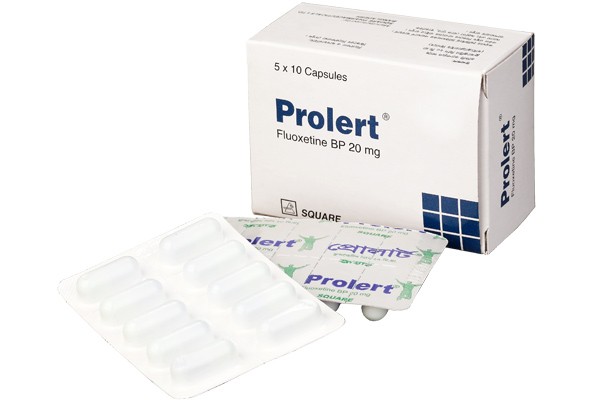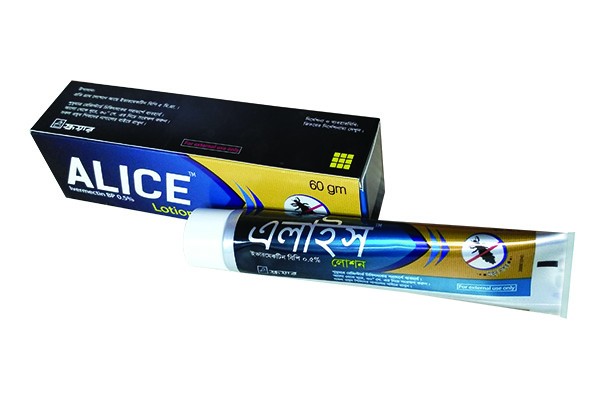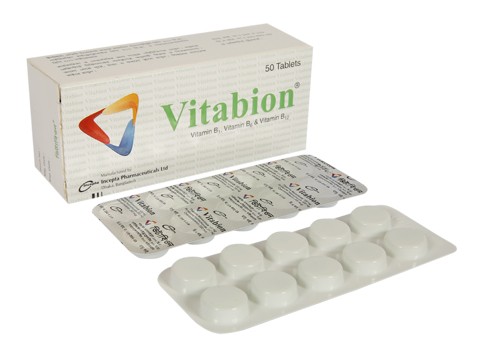

Prolert Capsule 20 mg (10Pcs)
Inhouse product
-
৳1,030.00
৳1,550.00 -
৳10.00
৳12.00 -
৳280.00
৳500.00 -
৳127.00
৳132.00 -
৳900.00
৳1,300.00 -
৳112.00
৳120.00
Reviews & Ratings
Indications
Fluoxetine is indicated in-
Depressive illnessIndications
Fluoxetine is indicated in-
Depressive illness
Bulimia nervosa and anorexia nervosa
Obsessive compulsive disorders
Pre-menstrual syndrome
Therapeutic Class
Phenothiazine related drugs
Pharmacology
Fluoxetine Hydrochloride is a phenylpropylamine derivative antidepressant for oral administration, it is chemically unrelated to tricyclic, tetracycline or other available antidepressants.
Fluoxetine has been shown to selectively inhibit the reuptake of serotonin (5-HT) at the presynaptic neuronal membrane which causes increased synaptic concentration of serotonin in the CNS. This results in numerous functional changes associated with enhanced serotonergic neurotransmission.
Fluoxetine appears to have no effect on the reuptake of norepinephrine and dopamine and does not exhibit antihistaminic or alpha1 adrenergic blocking activity at usual therapeutic doses.
Dosage & Administration
Initial treatment: Recent studies suggest that 20 mg/day of Fluoxetine may be sufficient to obtain satisfactory antidepressant response. Consequently, a dose of 20 mg/day administered in the morning is recommended as the initial dose.
A dose increase may be considered after several weeks if no clinical improvement is observed. Dosage above 20 mg/day, should be administered on a bid schedule (i.e. morning and noon) and should not exceed a maximum dose of 80 mg/day. As with other antidepressants, the full antidepressant effect may be delayed until 4 weeks of treatment or longer. As with many other medications, a lower or less frequent dosage should be used in patients with renal and/or hepatic impairment.
A lower or less frequent dosage should also be considered for patients, such as elderly, with concurrent disease or on multiple medication. A recommended maximum dose for elderly patients is 60 mg per day.
Maintenance treatment: It is generally agreed among expert psychopharmacologists that acute episode of depression requires several months or longer sustained pharmacologic therapy. Fluoxetine is also used in dosage of 60 mg daily for the management of bulimia nervosa.
Interaction
May lead to serotonin syndrome with serotonergic drugs (e.g. triptans, TCAs, fentanyl, tramadol, lithium, buspirone, tryptophan). May increase risk of bleeding with aspirin, NSAIDs, warfarin and other anticoagulants. May increase plasma levels of phenytoin.
Potentially Fatal: May increase risk of serotonin syndrome with concomitant admin or within 14 days of MAOIs withdrawal. May increase the QTc prolonging effect of pimozide and thioridazine.
Contraindications
Fluoxetine Hydrochloride is contraindicated in patients
known to be hypersensitive to it.
Monoamine oxidase inhibitors: There have been reports of serious, sometimes fatal reactions (including hyperthermia, rigidity, myoclonus, autonomic instability with possible rapid fluctuations of vital signs and changes of mental status that include extreme agitation progressing to delirium and coma) in patients receiving Fluoxetine in combination with monoamine oxidase inhibitors (MAOIs), and in patients who have recently discontinued Fluoxetine and are then started on MAOIs. Some cases presented with features resembling neuroleptic malignant syndrome. Therefore, Fluoxetine should not be used in combination with MAOI, or within 14 days of discontinuing therapy with MAOI. Since Fluoxetine and its major metabolites have very long elimination half-lives, at least 5 weeks should be allowed after stopping Fluoxetine and before starting MAOI.
Side Effects
Gastrointestinal: Nausea, vomiting, dyspepsia, dry mouth, and diarrhoea.
Neurological: Anxiety, nervousness, insomnia/ drowsiness and fatigue.
Others: Excessive sweating, pruritus, skin rashes associated with liver, kidney and lung involvement. It has therefore been advised that Fluoxetine therapy should be discontinued in any patient who develops a skin rash.
Pregnancy & Lactation
Pregnancy: In animal studies, no teratogenicity or harmful effect was found. Because animal reproductive studies are not always predictive of human responses, Fluoxetine should be used in pregnancy only if clearly needed.
Lactation: As Fluoxetine is excreted in human milk, caution should be exercised when Fluoxetine is administered to nursing women.
Precautions & Warnings
As Fluoxetine undergoes hepatic metabolism and renal excretion, it should be used with caution and in reduced doses in patients with impaired hepatic or renal function. Because of its epileptogenic effect, it should be used with caution in patients with epilepsy or a history of such disorders. Fluoxetine may alter glycaemic control and therefore caution is also warranted in diabetic subjects. Depressed patients with suicidal tendencies should be carefully supervised during treatment. Fluoxetine is not usually considered a suitable form of therapy for the depressive component of bipolar (manic depressive) illness as mania may be precipitated.
Use in Special Populations
Use in children: The use of Fluoxetine in children is not recommended as safety and efficacy have not been established.
Overdose Effects
Symptoms: Nausea, vomiting, seizure, CV dysfunction ranging from asymptomatic arrhythmias to cardiac arrest (including ventricular arrhythmias and nodal rhythm) or ECG changes indicative of QTc prolongation to cardiac arrest, pulmonary dysfunction, signs of altered CNS status ranging from excitation to coma.
Management: Symptomatic and supportive treatment. May admin activated charcoal w/ sorbitol.
Storage Conditions
Store between 20-25° C. Protect from light.Bulimia nervosa and anorexia nervosa
Obsessive compulsive disorders
Pre-menstrual syndrome
Therapeutic Class
Phenothiazine related drugs
Pharmacology
Fluoxetine Hydrochloride is a phenylpropylamine derivative antidepressant for oral administration, it is chemically unrelated to tricyclic, tetracycline or other available antidepressants.
Fluoxetine has been shown to selectively inhibit the reuptake of serotonin (5-HT) at the presynaptic neuronal membrane which causes increased synaptic concentration of serotonin in the CNS. This results in numerous functional changes associated with enhanced serotonergic neurotransmission.
Fluoxetine appears to have no effect on the reuptake of norepinephrine and dopamine and does not exhibit antihistaminic or alpha1 adrenergic blocking activity at usual therapeutic doses.
Dosage & Administration
Initial treatment: Recent studies suggest that 20 mg/day of Fluoxetine may be sufficient to obtain satisfactory antidepressant response. Consequently, a dose of 20 mg/day administered in the morning is recommended as the initial dose.
A dose increase may be considered after several weeks if no clinical improvement is observed. Dosage above 20 mg/day, should be administered on a bid schedule (i.e. morning and noon) and should not exceed a maximum dose of 80 mg/day. As with other antidepressants, the full antidepressant effect may be delayed until 4 weeks of treatment or longer. As with many other medications, a lower or less frequent dosage should be used in patients with renal and/or hepatic impairment.
A lower or less frequent dosage should also be considered for patients, such as elderly, with concurrent disease or on multiple medication. A recommended maximum dose for elderly patients is 60 mg per day.
Maintenance treatment: It is generally agreed among expert psychopharmacologists that acute episode of depression requires several months or longer sustained pharmacologic therapy. Fluoxetine is also used in dosage of 60 mg daily for the management of bulimia nervosa.
Interaction
May lead to serotonin syndrome with serotonergic drugs (e.g. triptans, TCAs, fentanyl, tramadol, lithium, buspirone, tryptophan). May increase risk of bleeding with aspirin, NSAIDs, warfarin and other anticoagulants. May increase plasma levels of phenytoin.
Potentially Fatal: May increase risk of serotonin syndrome with concomitant admin or within 14 days of MAOIs withdrawal. May increase the QTc prolonging effect of pimozide and thioridazine.
Contraindications
Fluoxetine Hydrochloride is contraindicated in patients
known to be hypersensitive to it.
Monoamine oxidase inhibitors: There have been reports of serious, sometimes fatal reactions (including hyperthermia, rigidity, myoclonus, autonomic instability with possible rapid fluctuations of vital signs and changes of mental status that include extreme agitation progressing to delirium and coma) in patients receiving Fluoxetine in combination with monoamine oxidase inhibitors (MAOIs), and in patients who have recently discontinued Fluoxetine and are then started on MAOIs. Some cases presented with features resembling neuroleptic malignant syndrome. Therefore, Fluoxetine should not be used in combination with MAOI, or within 14 days of discontinuing therapy with MAOI. Since Fluoxetine and its major metabolites have very long elimination half-lives, at least 5 weeks should be allowed after stopping Fluoxetine and before starting MAOI.
Side Effects
Gastrointestinal: Nausea, vomiting, dyspepsia, dry mouth, and diarrhoea.
Neurological: Anxiety, nervousness, insomnia/ drowsiness and fatigue.
Others: Excessive sweating, pruritus, skin rashes associated with liver, kidney and lung involvement. It has therefore been advised that Fluoxetine therapy should be discontinued in any patient who develops a skin rash.
Pregnancy & Lactation
Pregnancy: In animal studies, no teratogenicity or harmful effect was found. Because animal reproductive studies are not always predictive of human responses, Fluoxetine should be used in pregnancy only if clearly needed.
Lactation: As Fluoxetine is excreted in human milk, caution should be exercised when Fluoxetine is administered to nursing women.
Precautions & Warnings
As Fluoxetine undergoes hepatic metabolism and renal excretion, it should be used with caution and in reduced doses in patients with impaired hepatic or renal function. Because of its epileptogenic effect, it should be used with caution in patients with epilepsy or a history of such disorders. Fluoxetine may alter glycaemic control and therefore caution is also warranted in diabetic subjects. Depressed patients with suicidal tendencies should be carefully supervised during treatment. Fluoxetine is not usually considered a suitable form of therapy for the depressive component of bipolar (manic depressive) illness as mania may be precipitated.
Use in Special Populations
Use in children: The use of Fluoxetine in children is not recommended as safety and efficacy have not been established.
Overdose Effects
Symptoms: Nausea, vomiting, seizure, CV dysfunction ranging from asymptomatic arrhythmias to cardiac arrest (including ventricular arrhythmias and nodal rhythm) or ECG changes indicative of QTc prolongation to cardiac arrest, pulmonary dysfunction, signs of altered CNS status ranging from excitation to coma.
Management: Symptomatic and supportive treatment. May admin activated charcoal w/ sorbitol.
Storage Conditions
Store between 20-25° C. Protect from light.
Frequently Bought Products
-
৳1,030.00
৳1,550.00 -
৳10.00
৳12.00 -
৳280.00
৳500.00 -
৳127.00
৳132.00 -
৳900.00
৳1,300.00 -
৳112.00
৳120.00
Online Shopping Bangladesh : MShopBD-Majumder Shop
MShopBD-Majumder Shop Online Shopping in Bangladesh is the Best Shopping store within 10000+ products cash on delivery in dhaka, Khulna, ctg & all over Bangladesh with COD-cash on delivery (Only Shipping Cost Advance ) under by www.esdp.gov.bd (bangladesh.gov.bd ) Home Delivery all Over Bangladesh different location and shop as like as Multivendor Online Sites in BD.
Thank you for choosing MShopBD - Majumder Shop!







